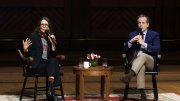Charles Hayford writes, “One of the Beat poets, I think, perhaps Gary Snyder, wrote of walking in the mountains in late winter or early spring. He comes around a corner and spies a brave spot of red budding up through a last snowbank and thinks how strikingly beautiful and hopeful it is. When he gets closer, he sees that it’s actually an empty Coke can and thinks how ugly and dispiriting it is. Then he stops and thinks again: until his conscious mind interfered, he simply enjoyed what he saw. Can anyone tell me who wrote this and where?”
“The distant hills draw night” (March-April). David Croson submitted a possible lead, not from a poem, but from the October 1902 issue of Country Life in America, in which W.B. Thornton, in “A Calendar of October,” mentions (in Part II: “A-Field with Dog and Gun”) that the “distant hills draw on their nightcaps of deep purple.”
“The real questions….” In response to a query about the source of “The real questions are the ones that intrude upon your consciousness whether you like it or not”—attributed to the writer Ingrid Bengis online—the author has identified the statement as the second sentence of her 1973 feminist classic, Combat in the Erogenous Zone: Writings on Love, Hate, and Sex.
Send inquiries and answers to “Chapter and Verse,” Harvard Magazine, 7 Ware Street, Cambridge 02138, or via e-mail to chapterandverse@harvardmag.com.







